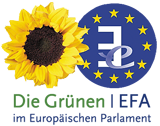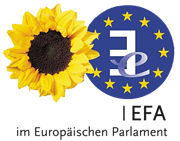To view the English version please click on the above icon 'en'
Pour voir la version francaise veuillez cliquer sur l'icone 'fr' ci-dessus.
Wir dürfen die Ukraine jetzt nicht aufgeben. Bis zum Vilnius-Gipfel am 28. und 29. November müssen wir alles tun, um das Land auf seinem Weg Richtung Europa zu stärken. Die Ukraine braucht das Assoziierungsabkommen mit der Europäischen Union für seine wirtschaftliche, aber auch seine demokratische Entwicklung!
Ich bin seit Jahren eng mit der Ukraine verbunden - zunächst durch meine Besuche in der Sperrzone von Tschernobyl. Dort war ich schon 1988 als Dokumentarfilmerin unterwegs. In dieser Zeit ist mir das Land ans Herz gewachsen. Ich bin über die Jahre immer wieder dort gewesen: zu mehreren Wahlbeobachtungen, zu Besuchen bei Julia Timoschenko und während der Orangenen Revolution. Schließlich 2012 zu Protestaktionen während der Fussball-Europameisterschaft. Mir war es unerträglich zu sehen, wie die Menschen in den Stadien ihren Sport feierten, während nur unweit entfernt die erkrankte Oppositionspolitikerin Julia Timoschenko im Gefängnis saß. Ich habe sie dann auch im Gefängnis besuchen dürfen. Es war beeindruckend, mit welcher Überzeugung sie sich selbst in dieser Situation weiter für ihr Land einsetzte. Aber ich habe auch gemerkt, wie dringend sie eine umfassende medizinische Versorgung braucht. Von ihrer Tochter weiß ich, dass sich ihre Situation seitdem noch verschlechtert hat.
Deshalb müssen wir alles daran setzen, ein Gesetz zu erreichen, dass eine Lösung für den Fall Timoschenko bringt. Sie selbst hat erklärt, eine Ausreise nach Deutschland zur weiteren medizinischen Versorgung wäre für sie eine solche Lösung. Aber das Parlament in Kiew hat die Entscheidung über das Gesetz in dieser Woche wieder vertagt - ohne Beratung. Die Opposition rund um den ehemaligen Boxer Vitali Klitschko hatte Recht, als sie die Sitzung mit den Rufen "Schande, Schande!" beendete.
Für uns im Europäischen Parlament war diese Vertagung eine besondere Provokation, weil unsere Ukraine-Vermittler, der ehemalige Präsident des EU-Parlaments Pat Cox und der ehemalige polnische Präsident Alexander Kwasniewski, ebenfalls im Ukrainischen Parlament waren. Sie hatten den Kompromiss für dieses Gesetz mit der ukrainischen Führung mit ausgehandelt. Aber offenbar scheint man die europäischen Bemühungen in Kiew nicht ernst zu nehmen.
Dieser Eindruck wird noch verstärkt, weil in dieser Woche außerdem fünf weitere Oppositionspolitiker aus verschiedenen Gründen angeklagt worden sind. Darunter auch der Anwalt von Julia Timoschenko. Diese selektive und politisch motivierte Justiz muss ein Ende haben! Kiew muss sich endlich und eindeutig zu demokratischen und rechtsstaatlichen Prinzipien bekennen. Die Freilassung Timoschenkos wäre dafür ein erster und wichtiger Schritt.
Dennoch: Noch darf das Assoziierungsabkommen nicht aufgegeben werden! Ich werde mich in den kommenden Tagen über meine Kontakte in der Ukraine weiterhin für die Annäherung an die Europäische Union einsetzen. Ich befürworte das Abkommen weiterhin - aber nicht um jeden Preis! Die Europäische Union darf jetzt nicht einknicken. Die EU-Außenminister müssen ein klares Signal an die Führung in Kiew senden: Ein Assoziierungsabkommen darf es nur geben, wenn die Bedingungen, die die EU dafür gestellt hat, erfüllt werden. Die Freilassung oder zumindest die Ausreise Timoschenkos zur medizinischen Behandlung gehören unbedingt dazu.
(Foto: Andrew Bossi)
~en~
Association Agreement with Ukraine – Don’t Give Up Now!
We cannot give Ukraine up now. Until the Vilnius summit on November 28th and 29th, we must do all that we can do to support the country moving closer towards Europe. Ukraine needs the association agreement with the European Union not only for its economic development, but also for its democratic evolution!
I have maintained close ties with Ukraine for years – starting with my visits to the Chernobyl restricted zone. I travelled in the area as a documentary filmer as early 1988. During that time, I grew very fond of the country. Over the years, I have returned time and again: on a number of election monitoring missions, visiting Yulia Tymoshenko, during the Orange Revolution, and also in 2012 to take part in protests held at the time of the European Football Championship. I found it unbearable to see the people in the stadiums celebrating their sport, while at the same time opposition politician Yulia Tymoshenko was locked up in a nearby prison in seriously ill health. I ultimately received permission to visit her in jail. What impressed me profoundly was her incredibly firm commitment to her country even in her present situation. But I also saw that she is in urgent need of comprehensive medical care. I have learned from her daughter that her state has further deteriorated since.
We must therefore make every effort to arrive at a law that will resolve the case of Yulia Tymoshenko. She herself has stated that her departure to Germany for further medical treatment would be such a resolution. However, the Kiev parliament this week again deferred the decision on this law to an unspecified date – without deliberation. The opposition rallying around former boxing champion Vitaly Klitschko appropriately ended the session crying “Shame, shame!”
To us at the European Parliament this postponement is a particular provocation since our Ukraine mediators, the former president of the EU Parliament, Pat Cox, and the former president of Poland, Aleksander Kwasniewski, were also in attendance at the Ukrainian Parliament. They had previously participated in negotiations with the Ukrainian leadership that resulted in the compromise needed for this law. However, it appears that the European initiative is not being taken seriously in Kiev.
This impression is further amplified by the fact that this week, five other opposition politicians were put on trial on a variety of charges. Yulia Tymoschenko’s lawyer is among them. This kind of selective and politically motivated justice must come to an end! Kiev must commit itself finally and unequivocally to democratic and constitutional principles. Releasing Tymoshenko would be an important first step in that direction.
But still: the association agreement must not be abandoned! In the coming days I will continue to use my Ukrainian contacts to help bring the country closer to the European Union. I remain a supporter of the agreement – but not at all costs! The European Union must not buckle now. The EU foreign ministers need to send a clear message to the government in Kiev: There will only be an association agreement if the conditions set by the EU are met. Tymoshenko’s release, or at least letting her leave the country to receive medical treatment, is an essential part of this.
(Picture: Andrew Bossi)
~/en~
~fr~
Accord d’association avec l’Ukraine : ne pas laisser tomber maintenant !
Ce n’est pas le moment de laisser tomber l‘Ukraine. Jusqu’au sommet de Vilnius des 28 et 29 novembre, nous devons tout mettre en œuvre pour renforcer le pays dans son cheminement vers l’Europe. L’Ukraine a besoin de l’accord d’association avec l’Union européenne pour son développement économique, mais aussi démocratique.
Je suis étroitement liée à l‘Ukraine depuis de nombreuses années. D’abord en raison de mes diverses visites dans la zone interdite de Tchernobyl. J’ai été sur place en tant que réalisatrice de films documentaire dès 1988. C’est durant cette période que ce pays a commencé à prendre une place dans mon cœur. D’année en année, j’ai continué à m’y rendre : pour y suivre plusieurs élections, pour rendre visite à Ioulia Timochenko et lors de la révolution orange. Et enfin en 2012, lors de manifestations durant la coupe européenne de football. Je ne pouvais supporter que pendant que les supporters fêtaient leur sport dans les stades, l’opposante politique Ioulia Timochenko, souffrante, se trouvait toujours en prison non loin de là. J’ai aussi pu lui rendre visite en prison. J’ai été impressionnée par la conviction avec laquelle elle continuait à défendre son pays dans une telle situation. Mais j’ai aussi pu constater avec quelle urgence elle nécessitait des soins médicaux. J’ai aussi appris de sa fille que depuis lors, son état s’est encore aggravé.
C’est pourquoi nous devons tout mettre en œuvre pour qu’une loi apportant une solution au cas Timochenko soit votée. Elle a elle-même déclaré que son hospitalisation en Allemagne serait pour elle une telle solution. Mais le Parlement de Kiev a de nouveau reporté cette semaine sa décision concernant cette loi, sans même délibérer. L’opposition emmenée par l’ancien boxeur Vitali Klitschko a eu raison de terminer la séance en scandant : « C’est une honte, c’est une honte ! ».
Pour nous au Parlement européen, ce report constitue tout particulièrement une provocation parce que nos médiateurs en Ukraine, l’ancien président du Parlement UE Pat Cox et l’ancien président polonais Alexander Kwasniewski, étaient également au Parlement ukrainien. Ils avaient négocié avec le gouvernement ukrainien le compromis concernant cette loi. Mais de toute évidence, l’on ne semble pas prendre au sérieux les efforts européens menés à Kiev.
Cette impression est encore renforcée par le fait que cette semaine, cinq autres hommes politiques de l’opposition ont été inculpés pour diverses raisons. Parmi eux figure l’avocat d’Ioulia Timochenko. Il faut mettre un terme à cette justice sélective, guidée par la politique ! Kiev doit enfin se prononcer clairement en faveur des principes démocratiques propres à un État de droit. La libération d’Ioulia Timochenko constituerait à cet égard un premier pas important.
Quoi qu’il en soit, il ne faut pas encore faire une croix sur l’accord d’association ! Dans les prochains jours, je vais continuer à plaider en faveur du rapprochement avec l’Union européenne, grâce aux contacts que je possède en Ukraine. Je continue à défendre cet accord – certes pas à n’importe quel prix. L’Union européenne ne peut pas plier maintenant. Les ministres des Affaires étrangères de l’UE doivent donner un signal clair au gouvernement de Kiev : un accord d’association ne verra le jour que si les conditions que l’UE a posées sont remplies. La libération d’Ioulia Timochenko, ou du moins sa sortie du pays pour être soignée, en fait partie.
(Photo: Andrew Bossi)
~/fr~

